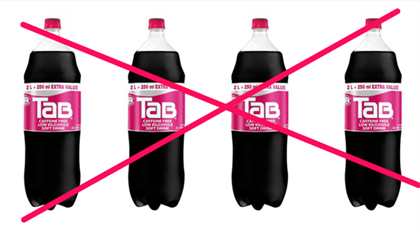
RIP TaB, 1963-2022: Coca-Cola makes final move to stop production
After 59 years of existence, the countdown to the retirement of diet soft drink TaB has begun in earnest with The Coca-Cola company ramping up its marketing campaign on social media this week about its replacement: Coca-Cola No Sugar No Caffeine.
With just over two months to go before the iconic sugar- and caffeine-free drink is no more, the group’s latest advertising campaign states TaB is "saying goodbye to SA for the last time" but that its brand "Coke No Sugar No Caffeine" is ready to take its place.
The departure of TaB has been known by the market for some time, with the company announcing its plan to retire it along with other select products in various markets around the world in 2020.
But, nonetheless, TaB, which is synonymous with the growth of the fitness industry in the 1980s that saw people pouring themselves the diet drink while getting into shape in aerobics classes and gyms around SA, will be sorely missed.
Coca-Cola confirmed that it will stop production of TaB at the end of the 2022 year but its "availability in stores is contingent on consumer purchasing behaviour".
This means consumers may still be able to pick up the drink in the new year depending on stock availability.
As to whether customers are flocking to stores to build up their TaB stocks in anticipation, Coca Cola it said that “as communication on our digital platforms has only recently begun, it is too early to make a determination at this time”.
Coca-Cola said the move to retire TaB and certain other products was "part of a global portfolio refresh, prioritising category-leading brands with the greatest potential for scale".
"This portfolio refresh will allow the company to invest in scaling brands and creating a portfolio of drinks that are positioned to capture growth in a fast-changing marketplace", it said.
It added that TaB was first introduced in 1963 as Coca-Cola’s "first-ever diet soft drink", also confirming that it "became a cultural icon in the 1980s and maintained a small but loyal following over the last few decades, primarily among fans who grew up with the beloved brand".
"For those consumers who prefer low-calorie/low-kilojoule, caffeine-free beverages, we continue to offer Coca-Cola No Sugar No Caffeine in South Africa."
News Category
- International retailers
- On the move
- Awards and achievements
- Legislation
- Wine and liquor
- Africa
- Going green
- Supplier news
- Research tools
- Retailer trading results
- Supply chain
- Innovation and technology
- Economic factors
- Crime and security
- Store Openings
- Marketing and Promotions
- Social Responsibility
- Brand Press Office
Related Articles

Warning of Eskom collapse

Knorr recalls brown onion gravy sachets

Eskom CEO shares good news about load-shedding

Tax warning for South African businesses


